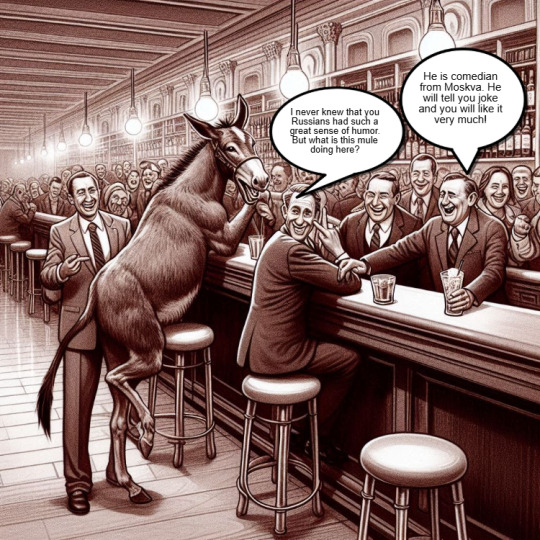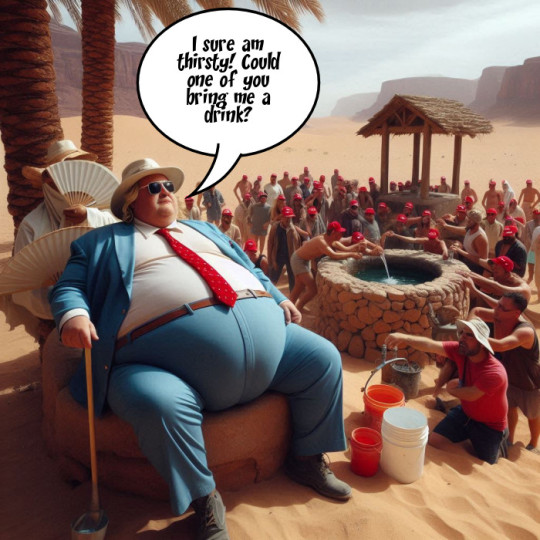Rolls off the Tongue tries to answer the question What's So Funny? We present jokes and explain why they are funny; And we take a very close look at English idiomatic expressions. We now have an APP ON ITUNES, called ENGLISH IDIOMS INTERACTIVE. The app is a cartoon guessing game, presenting the idiom, its meaning, and its origin, in a fun interactive format. Click on the TWO BUTTONS below to get either the IPHONE OR IPAD version. Idioms are the weirdest part of the English language. They never mean what they say. They "roll off the tongue" without stopping at the brain. Take a look at the cartoon/photo and try to guess the idiom being illustrated. It shows both the literal and figurative meaning of the idiomatic expression. We'll be posting new cartoons/photos weekly. Good Luck and Have Fun!
Don't wanna be here? Send us removal request.
Text

Here is this week's #photo #idiom. Can you guess the expression?
0 notes
Text

GET A KICK OUT OF
Idiomatic Meaning: Find something amusing, enjoyable, or exciting. It implies a sense of pleasure or thrill derived from a particular experience or thing.
Literal Meaning: Doing something that results in the doer being struck by another’s person’s foot in his/her posterior.
Usage: Informal, spoken and written, general American and British English. The phrase can be applied to a variety of situations where someone experiences thrilling enjoyment or amusement.
Origin: Early 20th Century – This expression likely stems from the physical sensation of a "kick" providing a jolt or thrill. While it's difficult to pinpoint an exact single origin, the phrase gained popularity in American English, particularly during the 1920s and 1930s. One of the earliest appearances in print, can be found in a 1928 advertisement for Lucky Strike cigarettes. The ad featured the slogan "Reach for a Lucky instead of a sweet. 'It's toasted'--no throat irritation--no cough. The toasted flavor gives you a kick." Here, "kick" is used to convey a pleasurable sensation. Another early instance comes from the lyrics of the 1934 song "I Get a Kick Out of You" by Cole Porter. The song's widespread popularity undoubtedly helped popularize the idiom. The lyrics clearly demonstrate the meaning of finding enjoyment or excitement in something: "I get a kick out of you / You're so supreme / You give me a theme / For a dream..."
Why is this funny? In the photo, we see a large, crowded, drinking establishment, somewhere in Russia. Everyone is laughing and appears to be having a good time, listening to and telling jokes. Someone, not a Russian, possibly an American, is sitting next to a large mule at the bar. He comments on all the laughter and also asks the bartender why there’s a mule sitting at the bar. The bartender informs him that he’s a Moscow Mule and it happens to be a comedian. He tells the American that when the mule tells him a joke, he’ll think it’s really funny and he will enjoy it a lot. What the American doesn’t see is that the mule is about to kick him. He expects to “get a kick out of the mule’s joke”, while instead he’ll be getting an actual kick from the mule!
Sample sentence: I’m not a homebody; I “get a kick out of” exploring new places.
3 notes
·
View notes
Text

Here is this week's #illustration #idiom. Can you guess the expression?
0 notes
Text

GIVE THE GAME AWAY
Idiomatic Meaning: Reveal a secret, a plan, or an intention, often inadvertently. It implies spoiling a surprise or disclosing information that was meant to be kept hidden, thereby ruining the intended effect or outcome.
Literal Meaning: Provide someone with a pastime involving competition.
Usage: Formal and informal, spoken and written, general British and American English. It is generally used when the revelation is accidental, careless, or premature, rather than a deliberate betrayal, but it can be deliberate as a strategy. It carries a sense of something being spoiled or ruined because of the disclosure.
Origin: 18th Century – This expression is fairly literal and stems from games or competitions where revealing one's strategy or a pre-arranged trick would indeed "give away" the advantage or the intended outcome of the game. The phrase, or very similar constructions, began appearing in print in the 18th century. Earlier forms like "discover the game" or "betray the game" also existed. “Spill the beans” is a similar idiom.
Why is this funny? In the photo, we see a middle-aged man approaching his house. His daughter is on the front walk, waiting for him and carrying a large video game console. She reveals that the house is full of people hiding and waiting to surprise him for his birthday and give him the video game as a present. However, "give the game away" gained prominence and became more standardized in the 19th century. She “gave the game away” by telling him that they want to give the game away to him, for his birthday!
Sample sentence: The politician's mental slip in the interview completely “gave the game away” about their secret negotiation strategy.
3 notes
·
View notes
Text

Here is this week's #photo #idiom. Can you guess the expression?
1 note
·
View note
Text

SELL SOMEONE SHORT
Idiomatic Meaning: Undervalue someone or something; underestimate their abilities, worth, or potential; fail to recognize or appreciate their true qualities; not give credit – thereby limiting opportunities and lowering expectations.
Literal Meaning: This expression applies to inanimate objects as well as ideas or concepts. More specifically in the field of investments, it means to invest or bet that something will lose in value in the future. Fortunately, it no longer applies literally to people.
Usage: Formal and informal, spoken and written, general British and American English. The phrase can be used in multiple contexts, such as discussions of potential and ability, situations where someone’s contributions are not recognized, as a warning or piece of advice, or even self-reflection.
Origin: Late 19th – Early 20th Century – This expression comes from the world of finance and investment. When an investor sells a stock short, they sell borrowed stocks, expecting to buy them back later at a lower price to profit from the difference. This inherently involves the expectation that the value of the asset will decrease. The practice dates back to the 17th century. The term evolved metaphorically 200 years later.
Why is this funny? In the photo, we see a group of “tech bros” in a smoke-filled cigar lounge, smoking, drinking whiskey, and chatting about making money. One of them brags that he just made $20 million by short selling Tesla stock, which he probably did because of Elon Musk’s unpopularity. Another “bro” cautions him no to underestimate Elon, while a third “bro” declares that Elon and his businesses are “toast”, i.e. ruined beyond repair. The second “bro” warns against “selling Elon short” by short selling his stock!
Sample sentence: It’s dangerous to “sell Trump short” because he has so much power as president.
4 notes
·
View notes
Text

Here is this week's #photo #idiom. Can you guess the expression?
1 note
·
View note
Text

TIP OF THE ICEBERG
Idiomatic Meaning: What is currently visible, known, or apparent is only a small, superficial part of a much larger, more complex, and often hidden problem, situation, or phenomenon.
Literal Meaning: The top part of an iceberg that appears out of the water, roughly 10%, leaving the other 90% hidden under water. However, there is another meaning of “tip” as brief advice, so the literal meaning could refer to an iceberg giving advice.
Usage: Formal and informal, spoken and written, general British and American English. The phrase is used to convey a sense of a greater, often more troubling, reality lying beneath the surface. It suggests that what you are seeing or dealing with at the moment is just a preliminary indication of a much bigger issue.
Origin: 20th Century – This expression is directly related to the physical characteristics of icebergs. An iceberg, by definition, is a large piece of freshwater ice that has broken off a glacier or ice shelf and is floating freely in open water. The crucial aspect is that only a small portion (typically around 10%) of an iceberg is visible above the water's surface, while the vast majority of its mass is hidden beneath. This natural phenomenon led to the metaphorical use of the phrase. The sinking of the ship The Titanic in 1912 is often cited as spawning the phrase, it’s possible that it didn’t appear in print until the 1960’s.
Why is this funny? In the photo, we see the tip of an iceberg which has floated up to a glacier. The iceberg is giving some advice or a tip on the stock market to the iceberg, suggesting it should sell any stocks that it owns because there is going to be a recession, economic, or perhaps affecting glaciers, due to climate change. The tip of the iceberg was that the recession the glaciers were experiencing, was just of hint of more serious recession to come, in other words it was the “tip of the iceberg”
Sample sentence: The visible signs of climate change, like rising sea levels, are merely “the tip of the iceberg” of the environmental challenges we face.
0 notes
Text

Here is this week's #photo #idiom. Can you guess the expression?
0 notes
Text

GET/HAVE A TOL HOLD
Idiomatic Meaning: Gain a small, initial, and often precarious position or advantage from which further progress can be made. It implies establishing a secure, though perhaps limited, starting point in a difficult or competitive situation.
Literal Meaning: Grab someone’s toe and not let it go, or finding a place to insert one’s toe.
Usage: Formal and informal, spoken and written, general British and American English. Usage often relates to political or commercial endeavors where a small initial advantage is crucial. Also used in sports and personal achievement. The phrase often implies that the initial position is still somewhat vulnerable or requires further effort to solidify. It highlights the importance of even a small beginning in overcoming significant obstacles and is frequently used in positive or neutral contexts, emphasizing progress or a strategic beginning.
Origin: Late 19th - Early 20th Century – This expression is rooted in physical activities requiring a small, secure grip for the foot, particularly wrestling and rock climbing. In wrestling, a "toe hold" is a legitimate grappling technique. This literal sense of gaining a firm, controlling grip on a small part of the opponent's body likely contributed to the figurative meaning. In rock climbing or mountaineering, finding a "toe hold" is crucial for vertical ascent, The figurative meaning emerged from these literal applications, extending the concept of a small but vital point of support to more abstract situations.
Why is this funny? In the photo, we see two wrestlers grappling on the mat. One of them has the other in a specific lock involving the leg and foot of the other, immobilizing him. He has a firm toe hold. We hear a comment from a fan that he’s ready for a comeback, implying that he’s been losing but is now ready to start winning again. He “has a toe hold” on a new winning streak and maybe a championship.
Sample sentence: The new political party is hoping to “get a toe hold” in the local elections.
0 notes
Text

Here is this week's #photo #idiom. Can you guess the expression?
1 note
·
View note
Text

SIGHT FOR SORE EYES
Idiomatic Meaning: Something or someone that one is extremely pleased or relieved to see; signifies a welcome and comforting presence, especially after a period of absence, difficulty, or longing.
Literal Meaning: If your eyes are in pain and you see something that relieves that pain. however, “sight” is a homophone of “site”, so if the phrase is spoken, it could be referring to a website, with pleasant views.
Usage: Formal and informal, spoken and written, general British and American English. The phrase can be used to describe a beloved person returning after a long time, a much-needed object or solution appearing when one is in distress, a beautiful scene after being surrounded by ugliness or monotony, anything that brings immediate and profound comfort or joy.
Origin: 18th Century – This expression, though undoubtedly older, in written form is attributed to Jonathan Swift in his "A Complete Collection of Genteel and Ingenious Conversation". “Easy on he eyes” has a similar connotation.
Why is this funny? In the photo, we see a young woman, sitting at a bar, holding her cell phone and with an angry look on her face. Her friend notices her mood and asks about it. The young woman tells her friend that her old lover just posted pictures of a new lover. In an effort to make the young woman feel better, her friend suggests that she go to the internet to look at a website that has things or people to look at which will improve her mood. The young, good-looking woman, herself is a “sight for sore eyes” and because woman’s eyes are sore, the website’s content is designed to relieve them. It’s a site for sore eyes!
Sample sentence: To me, my daughter was a “sight for sore eyes”, not having seen her for 15 years because she had been deported.
3 notes
·
View notes
Text

Here is this week's #photo #idiom. Can you guess the expression?
0 notes
Text

CARRY SOMEONE'S WATER
Idiomatic Meaning: Perform menial or subservient tasks for someone, to do their bidding, or to serve their interests, often in an uncritical or even sycophantic manner. It carries a pejorative connotation, implying that the person "carrying water" is acting as a lackey or proxy for a more powerful figure, rather than on their own initiative or conviction.
Literal Meaning: Transport water for someone else rather than for oneself.
Usage: Formal and informal, general English. The phrase is often used in a political context, where one politician or media figure might be accused of "carrying water" for a party leader, a particular ideology, or a powerful lobby. It can also be used in business settings, describing an employee who blindly supports a superior's decisions, The phrase implies that the "water carrier" lacks integrity or independent judgment.
Origin: 19th Century – This expression is believed to have originated from a "water boy" in sports, who performed the lowliest tasks for the team. This imagery of a servant fetching water for others solidified the meaning of performing menial or subordinate duties. It is also tied to the historical role of actual "water carriers" who performed essential but often humble labor. The Oxford English Dictionary notes an 1835 usage "The captain—will you never be a freeman, Walter—will you always be a water-carrier for a master?" By the mid-20th century, particularly the 1950s, the phrase "diplomatic water carrier" was being used to describe someone doing the bidding of powerful figures in international relations. The phrase "to carry water for" in its more modern, chiefly political, sense seems to have gained prominence in the late 1970s.
Why is this funny? In the photo, we see an obese man sitting under a palm tree in a desert, perhaps in one of the Gulf States. There is something familiar about him. His minions are all wearing rad baseball caps. He declares that he is thirsty and asks for a drink of water. Members of his entourage always do his bidding. They fall all over themselves to “carry his water”.
Sample sentence: Despite his own doubts, the senator continued to “carry water for” the President's controversial policy."
2 notes
·
View notes
Text

Here is this week's #photo #idiom. Can you guess the expression?
5 notes
·
View notes
Text

OFF THE BAT
Idiomatic Meaning: Immediately, without delay, or at the very beginning. It implies that something happens right away, as soon as the opportunity arises or a situation begins.
Literal Meaning: A “bat” can be either a flying mammal that looks like a mouse, or it can be a longish, flat or rounded wooden stick used in the game of baseball or cricket to hit a pitched ball. It can also be a verb.
Usage: Informal, spoken general American and English. The phrase is used emphasize the immediacy of an action or reaction.
Origin: Late 19th- early 20th Century – This expression is firmly rooted in the game of baseball. Think about what happens when a batter makes contact with the ball. The ball comes "off the bat" and is immediately in play. There's no pause or preparation involved in that initial flight of the ball. The phrase began appearing in sports writing and general publications around the turn of the 20th century.
Why is this funny? In the photo, we see two spelunkers, or cave explorers, surrounded by flying bats whom they have disturbed in their cave. One guy is in serious agony, telling the other that he was bitten by one of the bats as soon as he entered the cave. His pain came from off the bat and right “off the bat”.
Sample sentence: “Off the bat” he knew he had made a mistake when he saw her reaction.
0 notes
Text

Here is this week's #photo #idiom. Can you guess the expression?
0 notes